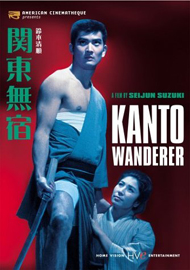| Release List | Reviews | Price Search | Shop | Newsletter | Forum | DVD Giveaways | Blu-Ray/ HD DVD | Advertise |
| Reviews & Columns |
|
Reviews DVD TV on DVD Blu-ray International DVDs Theatrical Reviews by Studio Video Games Features Collector Series DVDs Easter Egg Database Interviews DVD Talk TV DVD Talk Radio Feature Articles Columns Anime Talk DVD Savant HD Talk Horror DVDs Silent DVD
|
DVD Talk Forum |
|
|
| Resources |
|
DVD Price Search Customer Service #'s RCE Info Links |
|
Columns
|
 |
Kanto Wanderer
|
||||
The samurai and Yakuza films most commonly circulated in the U.S. were usually the most violent and least complex. Thus it is intriguing to find HVe and The American Cinematheque releasing '60s Japanese crime films that remain essentially foreign in conception. Kanto Wanderer is an intense Yakuza potboiler that plays variations on a form completely alien to uninitiated American viewers. It has some stylistic surprises that reveal a master director at work.
The box cover of Kanto Wanderer displays a muscled hero brandishing a sword, but there are only about 30 seconds of real violence in the film. The strange story eventually gets to some climactic bloodletting after 90 minutes of convoluted relationships and unusual story elements. The very first scene shows us three uniformed teenage schoolgirls giggling and smirking at the idea of seeing inside the world of the Yakuza, and we're soon treated to a tattooing played mostly for comedy. This 'action' movie has a passage where the girls discuss losing their virginity. One of them walks blithely into a life of prostitution. We frequently read that Akira Kurosawa's films were criticized at home for being 'too foreign', and Kanto Wanderer must be an example of a culturally all-Japanese film. The characters make gestures and especially facial reactions that seem far too exaggerated, often fronting insincere smiles that confound gaijin attempts to figure out where they're coming from. Hero Katsura is in a bind that doesn't seem like a trap, for all the elements are in plain sight. His elder bosses move blindly forward, ignoring the hostile actions of both the enemy clans and the loose-cannon foolishness of some of their own people. Katsura makes an effort to reclaim the schoolgirl sold into bondage as she's the friend of his boss'es own daughter, but gets hung up when he runs into a female cardsharp with whom he shares an erotic past. He loses heavily to her husband, and invites chaos by reopening their affair. Just as everything seems totally confused Katsura takes violent action that settles scores and rebalances the Yakuza code, earning the admiration of the entire underworld - only to have more chaos spoil his victory. If the true Yakuza ethos is about losing and defeat, Kanto Wanderer ends on a perfectly bleak note. Seijun Suzuki was practically rediscovered here by The American Cinematheque and has already appeared on Criterion DVD with his bizarre semi-abstract hitman films Branded to Kill and Tokyo Drifter. According to author Tom Mes, in this picture Suzuki was playing strange games with the genre, introducing odd elements like the giggling schoolgirls. Much of the film deals with traditional gambling played on long floor-level tables, and Suzuki shows games that break the usual stylistic rigidity with jokes and mistakes. With an existential logic similar to certain Westerns or the crime films of Jean-Pierre Melville, Suzuki crowds and twists his hero into a lose/lose decision. His final burst of violence becomes an assertion of core identity. The brief action is not cut for dynamic thrills, but is so surprising that it delivers a solid jolt anyway. Suzuki's penchant for visual abstraction breaks through when the paper walls of the set fall away to fill the screen with hyperrealist blast of crimson. It's arresting, to say the least, whether one is following the story or not. Akira Kobayashi is a stalwart hero easy to identify with, at least until he gets bogged down in fruitless attempts to best the top game-cheater in cards. A flashback shows how he received his facial scar, which changes from a detailed makeup job to a dash of greasepaint, depending on the scene. The lead schoolgirl is somewhat impenetrable to us foreigners - she lets herself be sold as a sex slave without the slightest protest, and then behaves as if becoming the consort of an old man (her girlfriend's dad!) were business as usual. We never see her involved in any of these relationships, so she remains hard to understand. Much more interesting is Katsura's old flame Mrs. Hachi (pictured on the boxtop). She's a femme fatale that sends our hero into bouts of romantic delirium, but is rather refreshingly ordinary-looking. Katsura's obsession is based in deeper feelings than just surface beauty, and we retain our respect for him even when he behaves against his own interests. In the midst of all the cynical exploitation, Katsura and Hachi win our concern. HVe and American Cinematheque's DVD of Kanto Wanderer is a beautiful transfer, enhanced for 16:9 and brightly colored. The clear soundtrack billboards the film's vibrant and active music score. There's an original trailer (very confusing) and a Seijun Suzuki filmography, but the most welcome extra is Tom Mes' essential liner essay. He explains some key contextual points about '60s Yakuza crime films and Suzuki's particular place within the genre, and helps us fool ourselves that we fully understand what's going on - without his guidance, the review above would be mostly question marks.
On a scale of Excellent, Good, Fair, and Poor,
Kanto Wanderer rates:
Review Staff | About DVD Talk | Newsletter Subscribe | Join DVD Talk Forum |
|
| Release List | Reviews | Price Search | Shop | SUBSCRIBE | Forum | DVD Giveaways | Blu-Ray/ HD DVD | Advertise |






